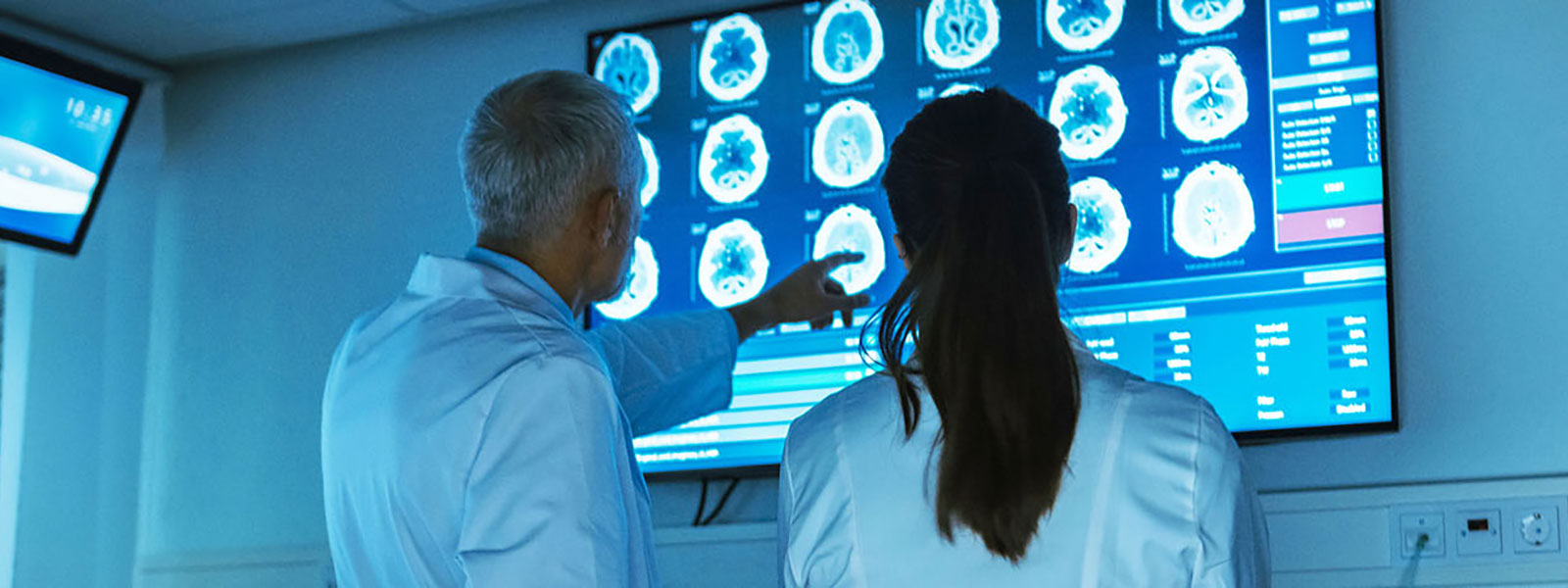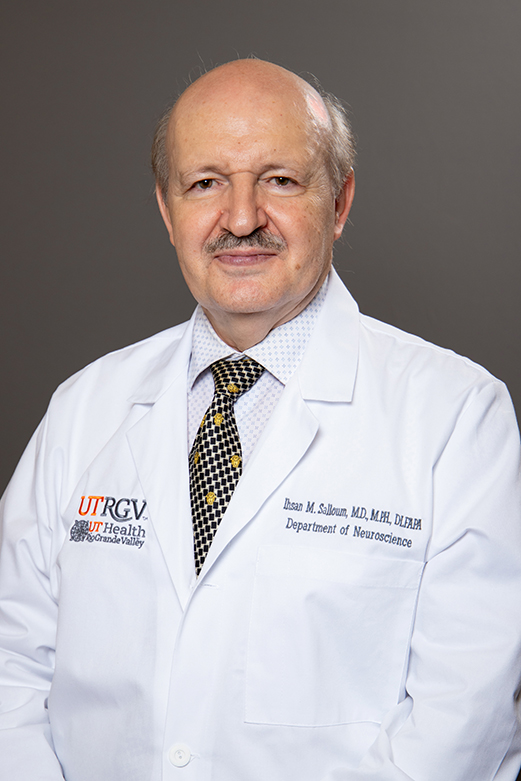Research at the Institute of Neuroscience
Research of the interdisciplinary faculty of the Institute of Neuroscience is supported by federal, state, and private foundation grants including the following:
The UTRGV Institute of Neuroscience Center for Brain Health
Funded by a generous grant from the Valley Baptist Legacy Foundation. Led by Dr. Ihsan Salloum. This grant supported training programs for faculty and research personnel and infrastructure of several units of the School of Medicine including Neuroscience, Neurology, Internal Medicine, Psychiatry, and Behavioral Health Integration in Primary Care.
Active research within the Institute of Neuroscience includes several federal and state-supported studies in the following areas:
Intervention Research for Complex Comorbidities:
- Treatment (clinical These studies are led by Dr. Ihsan Salloum, Professor and Founding Director of the Institute of Neuroscience. He is a national expert on innovative treatments for comorbid mood and substance use disorders. Studies include medication development for alcohol use disorder, studies of brain chronic inflammation, and studies that predict the development of alcohol use disorders among others.
- Training the next generation of investigators. As the Director of the UTRGV RCMI, Investigator Development Core, ION Investigators will have the primary role of training early-state investigators in cancer-related community research.
Alzheimer’s and Aging Research
Led by Dr. Gladys Maestre, Professor of Neuroscience and Human Genetics. Dr. Maestre’s research has explored cultural, educational, and genetic risks for Alzheimer’s disease and cognitive decline, as well as cognitive function and health among minorities and ethnically diverse populations across the lifespan. She is the director of the Alzheimer’s Disease Resource Center for Minority Aging Research at UTRGV. She is also co-director of the South Texas Alzheimer’s Disease Research Center, a nationally designated center of excellence for dementia care and research. Dr. Maestre’s research has been supported by the National Institute on Aging and the Texas Alzheimer’s Research and Care Consortium (TARCC) among others.
- Rio Grande Valley Alzheimer’s Resource Center for Minority Aging Research: Partnerships for Progress. Major Goal: To diversify the research workforce of aging minorities and support the conduct of research aimed at reducing the impacts of Alzheimer´s disease in Hispanics.
- The South Texas Alzheimer’s Disease Center. Major Goal: To develop infrastructure and data/bio-sample collections that will support researchers from multiple disciplines to conduct research to diminish the burden of Alzheimer’s Disease in Hispanics.
- Integration of Socio-Spatial Data for Neighborhoods with Multi-omic Profiles to Identify and Mitigate Factors Affecting Risk of Alzheimer's Disease. Major Goal: To study how a participant’s structural and social environment impacts cognitive health, mediated by biological pathways that are not simply attributable to genetics.
- Alzheimer’s Association International Conference (AAIC) Advancements: Towards Health Equity in Alzheimer’s and all other Dementias. Major Goal: To advance disparities research in dementia by developing and holding two 2-day conferences for which keynote, plenary, poster, and other presentations will be integrated into the NIA Health Disparities Research Framework (HDRF).
- UTRGV Diversity Center for Genome Research – Community Engagement Core: Major Goal: To establish new relationships and extend existing relationships with community members and community-based organizations: 1) address community-wide health concerns, 2) promote participation in genomic research, and 3) disseminate genomic research findings.
Laboratory of Neuroimaging and Neuromodulation
Led by Dr. Kelsey Baker, Assistant Professor, NBHISU Neuroscience a biomedical engineer with over 7 years of research experience in the field of neuroimaging, neurodegeneration, and plasticity.
- Her research is focused on 1) elucidating how varying degrees of damage in the brain and spinal cord can limit the performance of devices that interface with the central nervous system, 2) developing technologies to boost adaptive re-mapping in hopes of circumventing inherent damage and, 3) evaluating strategies to boost re-myelination in the brain following neurological insult. Dr. Baker’s research is supported by the Department of Defense and the National Institute of Health including:
- Targeted High-Definition Transcranial Direct Current Stimulation (tDCS) to Improve Upper Limb Rehabilitation in spinal cord injury (SCI). Major Goal: To evaluate several applications of high-definition tDCS in populations with spinal cord injury.
- Temporary Inactivation of Strong Muscle Sensation to Improve Rehabilitation Interventions in spinal cord injury (SCI). Major Goal: To initiate a clinical trial that will evaluate the use of temporary inactivation of strong muscle sensation to improve the function of surrounding weaker muscles in the upper limb after SCI.
- Improving Spinal Cord Injury Rehabilitation Interventions by Retraining the Brain. Major Goal: This is a Clinical Trial Award that will employ a Phase-II clinical trial to evaluate the efficacy of conventional transcranial direct current stimulation in populations of spinal cord injury.
Mexican Health and Aging Study
Led by Dr. Sylvia Mejia-Arango, Assistant Professor, NBHISU Neuroscience
- Subaward (funded by NIH-NIA 2023-2028), focuses on cognitive aging, based on analyses of national population-based data to estimate dementia and on cross-national comparisons to study cognition and health. It is a collaboration with the Mexican Health and Aging Study (MHAS) and its ancillary study, the Mex-Cog study.
- The detection of prodromal AD/ADRD: The project aims to improve the early detection of cognitive changes using digital technologies. Scientifically validated and highly sensitive objective measures of cognitive function correlated to neural networks will permit the detection of prodromal AD/ADRD. Utilizing the Cambridge Neuropsychological Test Automated Battery (CANTAB), a computer-based cognitive assessment system, and the BIOPAC, which includes eye-tracking capabilities.
Chronic Pain and Drug Abuse
Led by Dr. Khalid Benamar, a professor of NBHISU Neuroscience.
- Focuses on chronic pain, one of the most common reasons adults seek medical care, has been linked to restrictions in mobility and daily activities, dependence on opioids, anxiety, depression, sleep deprivation, and reduced quality of life. Current treatment options for chronic neuropathic pain (including the gold standard gabapentin) are often ineffective and have associated side effects. Our goals are to study the neurobiology of chronic pain (in particular, the descending pain modulatory system) and test the efficacy and safety of novel pharmacological combination strategies for chronic neuropathic pain. We are also interested in chronic pain and aging with neurodegenerative diseases. Alzheimer’s disease (AD), a devastating neurodegenerative disorder (characterized by a progressive impairment of cognitive functions) in the elderly, is often co-morbid with chronic pain. Our goal is to study the functional interaction between chronic pain and AD. We also Test new alternatives to prevent the development of physical dependence on opioids/cannabinoids and mitigate withdrawal symptoms.
- HIV-1 and Alzheimer’s disease (AD) Comorbidity: An estimated 39 million people were living with 50% of the US HIV-positive population is aged 50 years or older, mainly due to the successful treatment regimens helping HIV-positive adults survive for decades with HIV. There is concern that AD may become prevalent with an earlier onset of cognitive decline or accelerate the disease progression. Based on the similarity between AD and HIV, our goal is to test the hypothesis that HIV promotes the onset of cognitive decline in AD.


